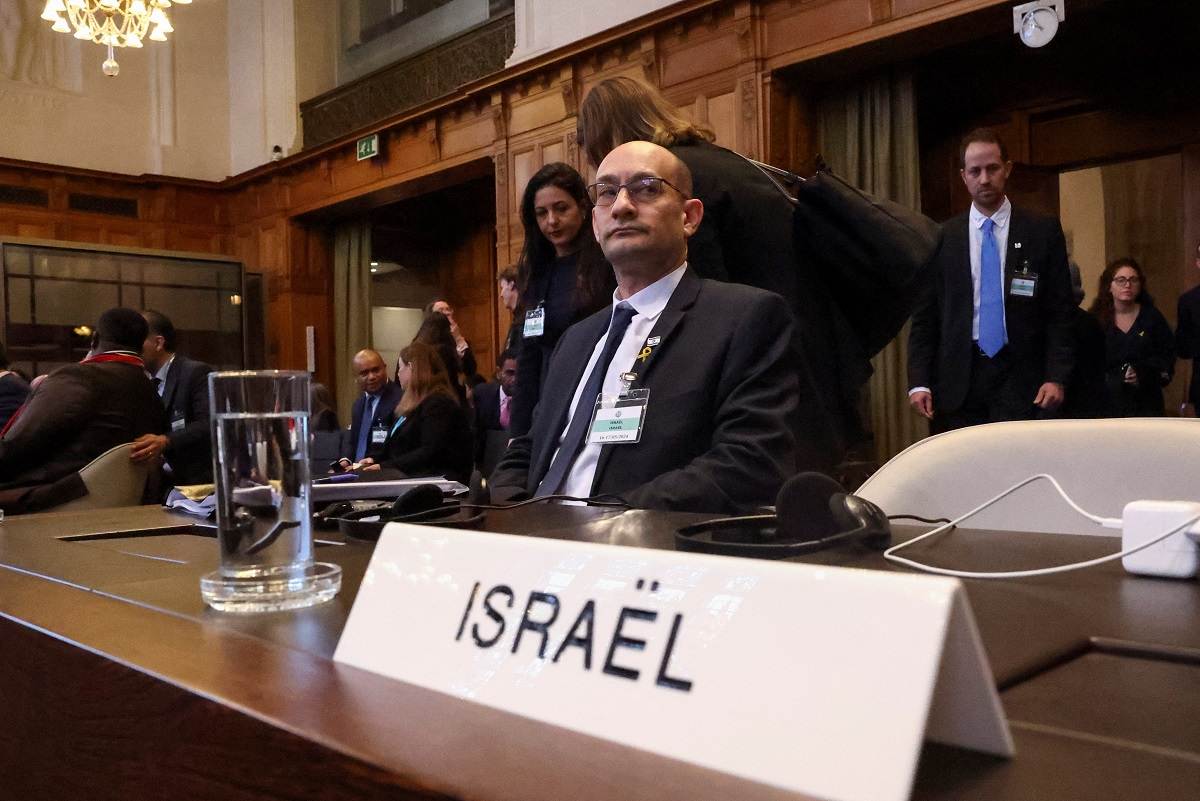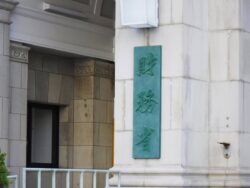
Israeli delegation members sit at the International Court of Justice (ICJ), at the start of a hearing where South Africa requests new emergency measures over Israel’s attacks on Rafah, as part of an ongoing case South Africa filed at the ICJ in December last year accusing Israel of violating the Genocide Convention during its offensive against Palestinians in Gaza, in The Hague Netherlands May 17, 2024.
17:31 JST, May 26, 2024
A ruling Friday from the International Court of Justice ordering an immediate halt to Israel’s military offensive in Rafah marked a stunning rebuke of the Israeli leadership’s prosecution of the war in Gaza, including the decision to send troops and tanks into a city where more than a million Palestinians had sought refuge.
The incursion into Gaza’s southernmost city, which began May 7, has already displaced more than 800,000 people, the court said, calling the developments “exceptionally grave.” Israel must halt the operation and open the Rafah crossing for the “unhindered” provision of aid, the judges said, adding that the offensive could destroy Palestinian life in Gaza.
Israeli officials swiftly indicated that they would ignore the ruling, which is binding but difficult to enforce, even as the high-profile judgment deepened Israel’s isolation on the world stage.
On Monday, the International Criminal Court’s chief prosecutor said that he was seeking arrest warrants for Israeli Prime Minister Benjamin Netanyahu and Defense Minister Yoav Gallant, as well as three members of the Hamas militant group’s senior leadership, for war crimes and crimes against humanity. The United Nations Security Council has also ordered a temporary halt in the fighting, to no avail.
In a closely watched case brought by South Africa in January, the ICJ had already ordered Israel to take all measures within its power to prevent genocide and to allow urgently needed humanitarian aid to flow into the enclave. This time, the court was asked to consider whether changes on the ground since that initial ruling were sufficiently urgent to require the panel to order an end to the fighting in and around Rafah.
In a statement read aloud inside The Hague’s Peace Palace, ICJ President Nawaf Salam said the court was not convinced by measures that Israel says it has taken to alleviate civilian suffering.
The panel voted 13-2 in favor of an order that Israel “immediately halt its military offensive, and any other action in the Rafah Governorate, which may inflict on the Palestinian group in Gaza conditions of life that could bring about its physical destruction in whole or in part.”
In a hearing last week, Israel had argued that the granting of South Africa’s request would leave Hamas free to launch attacks on Israeli territory. In a separate opinion, Dire Tladi, a South African judge on the court, described that position as a “false choice between two extremes.”
“It suggests that Israel is obliged either to allow the violation of its rights and those of its citizens or to engage in limitless operations causing the catastrophic consequences that have been so widely reported,” he wrote.
The court’s order applied to offensive action in Rafah, he said. “Legitimate defensive actions, within the strict confines of international law, to repel specific attacks, would be consistent with the Order of the Court.”
The conflict began Oct. 7, when Hamas militants killed some 1,200 people in southern Israel and took more than 240 others back to Gaza as hostages. Israel says its military campaign is aimed at eliminating the group, which ruled besieged Gaza for years, but the overwhelming firepower of Israeli forces has also leveled districts, destroyed the territory’s ability to feed itself, and damaged much of its hospital network.
More than 35,800 Palestinians have been killed during the seven-month operation, and another 80,000 have been wounded. The ICJ also ordered Israel to allow international investigators to enter Gaza, and reiterated a previous order for the immediate release of more than 100 hostages still held by Hamas and other groups.
Israeli officials reject the genocide charges, arguing that the soaring death toll in Gaza is an unavoidable consequence of battling an enemy that embeds in civilian areas. Benny Gantz, a centrist member of Israel’s war cabinet, said Friday that the Israeli military would continue its fight in Rafah.
“The State of Israel is committed to continue fighting to return its hostages and promise the security of its citizens – wherever and whenever necessary – including in Rafah,” he said in a statement after the ICJ’s ruling was announced. That fight, he said, would take place “in accordance with international law.”
The mounting international pressure has helped Netanyahu at home, galvanizing even his opponents into outrage. Many Israelis view the moves by international courts as misinterpretations of a war they see as existential.
A poll conducted by Israel’s Maariv newspaper, published Friday, found that 43 percent of those surveyed thought intensive military activity was the best route to freeing the hostages. Nearly half, or 49 percent, disagreed with the assertion that the ICC’s arrest warrants for Netanyahu and Gallant were the result of Israel’s poor execution of the war.
Friday’s ruling could also cause problems for the Biden administration. The United States has been a key supporter of the ICJ’s work, but is also Israel’s most important political and military ally, providing the majority of the weaponry that Israeli forces are using in their Gaza campaign.
The court’s orders must be enforced by the U.N. Security Council, whose five permanent members, including the United States, can veto resolutions.
Oumar Ba, an assistant professor of government at Cornell University, said, however, that the court’s decision was significant in the message it sent to Israel and its allies.
“It clearly states where the line has been drawn by the court when it comes to international law,” he said. “There is certainly an acceleration here … of Israel being basically on the accused bench and having to defend its stance and its action in the eye of the international community.”
The ICJ had ordered “provisional measures” Jan. 26, declaring that Palestinians had a right to be protected from acts of genocide and calling on Israel to take “all measures within its power” to prevent such actions, including by facilitating humanitarian aid.
But four months later, aid has slowed to a trickle, and the World Food Program says that northern Gaza is in “full-blown famine.”
Hundreds of thousand of people fleeing Rafah have packed into the rubble-strewn city of Khan Younis, or pitched tents on a beachfront in the Mawasi district that is now so crowded that families are living just feet from the high-tide mark.
The Biden administration had repeatedly warned Israel that a major military operation in Rafah constituted a red line for U.S. support. Now, with the offensive underway, administration officials have characterized Israel’s movements as “targeted and limited.”
Egypt on Friday said it agreed to begin sending aid trucks through Israel’s Kerem Shalom crossing, after Egyptian President Abdel Fatah El-Sisi spoke on the phone with President Biden.
After Israeli troops seized the Rafah crossing, Egypt refused to allow relief supplies backed up on its territory to be inspected at Kerem Shalom, which is just across the border with Israel.
Still, the move was unlikely to result improved aid flow to Gaza. Aid agencies there say accessing Kerem Shalom from the Palestinian side is difficult and risky – the area is a closed military zone, with active fighting nearby.
Mary Ellen O’Connell, a professor of law and peace studies at the University of Notre Dame, described the ICJ’s ruling Friday as the clearest indication yet that the operation in Rafah might be unfolding in contravention of international humanitarian law.
“This order from the court, 13, including the judge of U.S. nationality, are all saying this offensive cannot go forward,” she said.
“That should be the final word that President Biden needs to order the immediate cessation of weapons delivery,” she said. “We have a statute in the United States that we cannot deliver military assistance to a country that’s violating international humanitarian law. You can’t get a clearer decision or ruling on that being the case than this judgment.”
In the statement from ICC prosecutor Karim Khan, he said he had reasonable grounds to believe Netanyahu and Gallant were responsible for crimes including starvation as a method of warfare, willful killing and murder, extermination, and intentionally directing attacks against a civilian population.
The ICC is separate from the ICJ, but the warrant applications put further pressure on Israel. On Friday, European Union foreign policy chief Josep Borrell warned countries against trying to intimidate the ICC as a panel of judges now considers Khan’s request.
"News Services" POPULAR ARTICLE
-

American Playwright Jeremy O. Harris Arrested in Japan on Alleged Drug Smuggling
-

Japan’s Nikkei Stock Average as JGB Yields, Yen Rise on Rate-Hike Bets
-

Japan’s Nikkei Stock Average Licks Wounds after Selloff Sparked by BOJ Hike Bets (UPDATE 1)
-

Japanese Bond Yields Zoom, Stocks Slide as Rate Hike Looms
-

Japan’s Nikkei Stock Average Buoyed by Stable Yen; SoftBank’s Slide Caps Gains (UPDATE 1)
JN ACCESS RANKING
-

Keidanren Chairman Yoshinobu Tsutsui Visits Kashiwazaki-Kariwa Nuclear Power Plant; Inspects New Emergency Safety System
-

Imports of Rare Earths from China Facing Delays, May Be Caused by Deterioration of Japan-China Relations
-

University of Tokyo Professor Discusses Japanese Economic Security in Interview Ahead of Forum
-

Japan Pulls out of Vietnam Nuclear Project, Complicating Hanoi’s Power Plans
-

Govt Aims to Expand NISA Program Lineup, Abolish Age Restriction























